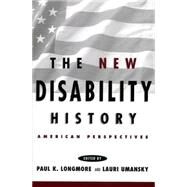- ISBN: 9780814785645 | 0814785646
- Cover: Paperback
- Copyright: 3/1/2001
View the Table of Contents Read the Introduction.Historians of medicine and technology will find this book an interesting introduction to a highly politicized and novel area of scholarship. This work should inspire research projects into more diverse and less categorized areas of disability. --Technology & CultureWith this work, Longmore and Umansky offer historians, sociologists and other readers intrigued by this area of scholarship an opportunity to understand disabilities as broader and more complex than a single, generic and primarily medical category. --Publishers WeeklyThe essays introduce into the historical record a diverse group of people whose views and experiences have been largely excluded, challenge conventional notions of bodily integrity, and represent an important new subfield in American history from which we can expect rich and exciting innovation. --The HistorianThe fifteen essays contained in it are thorough, wide-ranging and convincing in their interpretations.... This is a powerful contribution to the emancipatory efforts of disabled activists and one that historians should seek to encourage. For this, Longmore and Umansky''s collection should be strongly commended. --Journal of American StudiesThe New Disability History: American Perspectives is a truly groundbreaking volume and is well-deserving of the praise heaped on its back cover. --H-Net ReviewsThe essays show us that disability has a place in various parts of our history. While there is an enormous diversity of disability, the collection of essays reminds us of how comparable social perils recur across various disability groups and throughout their particular histories. --MetapsychologyDisability has always been a preoccupation of American society and culture. From antebellum debates about qualification for citizenship to current controversies over access and reasonable accommodations, disability has been present, in penumbra if not in print, on virtually every page of American history. Yet historians have only recently begun the deep excavation necessary to retrieve lives shrouded in religious, then medical, and always deep-seated cultural, misunderstanding.This volume opens up disability''s hidden history. In these pages, a North Carolina Youth finds his identity as a deaf Southerner challenged in Civil War-era New York. Deaf community leaders ardently defend sign language in early 20th century America. The mythic Helen Keller and the long-forgotten American Blind People''s higher Education and General Improvement Association each struggle to shape public and private roles for blind Americans. White and black disabled World War I and II veterans contest public policies and cultural values to claim their citizenship rights. Neurasthenic Alice James and injured turn-of-the-century railroadmen grapple with the interplay of disability and gender. Progressive-era rehabilitationists fashion programs to make crippled children economically productive and socially valid, and two Depression-era fathers murder their sons as public opinion blames the boys'' mothers for having cherished the lads'' lives. These and many other figures lead readers through hospital-schools, courtrooms, advocacy journals, and beyond to discover disability''s past.Coupling empirical evidence with the interdisciplinary tools and insights of disability studies, the book explores the complex meanings of disability as identity and cultural signifier in American history.Table of ContentsIntroduction: Disability History: From the Margins to the Mainstream Paul K. Longmore and Lauri UmanskyPart I: Uses and Contests1 Disability and the Justification of Inequality in American History Douglas C. Baynton2 Speech Has an Extraordinary Humanizing Power:Horace Mann and the Problem of Nineteenth-Century American Deaf Education R. A. R. Edwards3 This Unnatural and Fratricidal Strife: A Family''sNegotiation of the Civil War, Deafness, and Independence Hannah Joyner4 Trying to Idle: Work and Disability i







